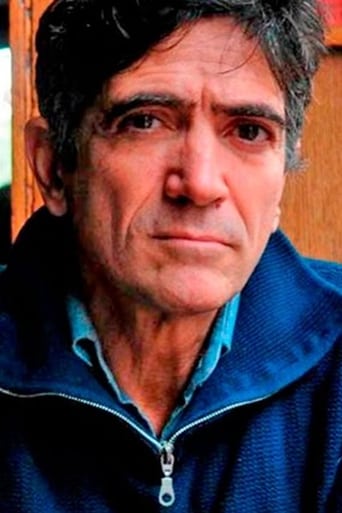Interesteg
What makes it different from others?
Boobirt
Stylish but barely mediocre overall
StunnaKrypto
Self-important, over-dramatic, uninspired.
Sarita Rafferty
There are moments that feel comical, some horrific, and some downright inspiring but the tonal shifts hardly matter as the end results come to a film that's perfect for this time.
movies-by-db
Esteban, Ricardo Darin, is a quiet normal guy with a normal life. He is meticulous in his work as a taxidermist but fantasizes about doing more exiting things with his life and intellect. While on a hunting trip with a friend, opportunity accidentally comes knocking and partially unbewilling he takes on a role more dangerous then he would have ever wanted or dreamed of.We, the viewer, take the plunge together with Esteban. His intelligence and especially his photographic memory help him to fill in a lot of the gaps, but of course we know from the start that he's in over his head. Still, we keep guessing, we keep getting snippets and clues of what's going on and where it's all going. It's film noir in it's purest form, a stunning, gripping mystery laden with suspense and dread. Everything happening at a snails pace but as Esteban slowly loses grip on the situation, the story grips the viewer tighter and tighter.Ricardo Darin is perfect as the naive Esteban. The man is magnetic and completely effortless. I love everything I've seen with him, but this is most definitely my favourite performance.A real big shame to loose such a talented director.'Nueve Reinas' was a great film and a huge promise, but man did it come true with this film. What other masterpieces could he have made. Made me a little sad whilst watching. These are the types of films I personally absolutely love. Sober, slow burning yet extremely watchable. Not nearly this good, but thematically similar and also pretty recent and from Argentina is 'Todos Tenemos Un Plan'. And another film this also reminded me of was 'Intacto' but then purely the mystery factor, and maybe some of the settings.Highly recommended masterpiece 10/10
NICO
The Aura is a very interesting and engaging movie filled with mystery and suspense. The story is complex and well thought out, while at the same time containing characters that are peculiar and entertaining. The main character Esteban Espinosa for instance, is a serious man who suffers from epilepsy, therefore giving off the impression that he could pass out and freeze at any moment. The director of the film cleverly uses foreshadowing and irony in order to add some literary value to the production. By Esteban having thoughts of robbing a volt at the beginning of the film, the director establishes a foreshadowing of events to come. Moreover, the appearance of blood on a dog's snout also serves as a foreshadowing for future events involving blood. Finally, the use of irony is seen in the person of Esteban, who is against killing animals, but ends up killing a man instead.
tedg
I am trying to understand the contribution of sound to cinematic narrative. It seems multidimensional compared to the linearity of the delivered narrative and three dimensional nature of the cinematic vocabulary. Though the detail we need to sustain narrative is missing, music (and sound generally) can form the skeleton of a rich narrative. It will take me some time to wade through this with the Zimmers and Elfmans distracting.Meanwhile, here is a film that understands the power of silence. The story revolves around man who takes dead things and makes them look as if they were alive and making noise. He himself has seizure disorder and often crosses that boundary between silence-blindness and speaking-seeing. In between, right on the edge of that transition, is "the aura," a strange supernatural state where dreams diffuse. Some people experience it as colors or sound; range pretty much covers everything. This man experiences it as a narrative, which form the "film within." Spanish-speaking filmmakers have a long tradition of interweaving realism with other layers, sometimes unfortunately called magical. The evolution of this explores all sorts of folds, and I believe that the possibilities are roughly the same explored by those trying to mix on-screen singing into a realistic narrative. It is not a reach to see the taxidermy and abandoned wife segments as more "real," and the heist segments as "in aura," with a transitional segment early in the movie where the heist is imagined from the alert state. Describing it this way does not do justice to the construction.The inner bits are noir-driven, meaning that there is an inevitability, a conspiracy of the cosmos. It has gambling, accidental engagements, partial but not adequate glimpses of what is going on. This filmmaker's last film worked this sort of thing with the imposition of the con game on "reality." Here he is much more masterful, seamless enough that he is able to give us both noir and an outer awareness, that recognition of the aura.If you think of it, the power that noir has over us is the way we see ourselves as helplessly buffeted by forces. But the form has become so formulaic that it loses its effectiveness, its art. This solution, what this filmmaker has done here is brilliant. Unfortunately forces beyond his control took him away from us into his own world now.The effectiveness of the noir dynamic here is accentuated by what he takes away. He takes the sound away. There are long pauses here. Time stands still for the viewer while the world moves. It is more effective than any score could be.Ted's Evaluation -- 3 of 3: Worth watching.
johnnyboyz
Films like El Aura are why I seek out foreign language pictures and take the time to sit down and watch them. In short, El Aura is brilliant; it grips you from the off and does not relent until it has delivered its twisting, turning, noir fuelled narrative about one man in way over his head. The film grabs you and does not relent its grip until the final few frames after which you remain inclined to sit there, absorbing the experience. Maybe that's been said a million times by a million people about a million films but not many cases have they been praising Spanish language, South American produced neo-noirs that carry as much substance as they do style.The film's theme is mistaken identity and its reoccurring idea is to do with blurring the boundaries between reality and non-reality. If the film is supposed to be a dream then the lead character of the piece is adopting a fake identity within a world that is manifested within his own psychosis anyway, which is a smarter set up than some thrillers of this nature can manage in 90 minutes. But the film's biggest compliment has to be paid to its attention to film theory in general. I believe it was Janey Place in the 1990s who wrote about noir being the supposed ultimate male fantasy on screen and she might well have been onto something – male leads living in criminal infused worlds in which the boundaries between good and evil are blurred at their leisure; places full of alluring women and hardened gangsters, not to mention an alluring lifestyle of adventure revolving around petty crime, amidst a playground of shifty, moody city streets.It is this writing El Aura seems to have clicked with and the visual results are this: a pounding and unpredictable thriller with a heist as its narrative drive and neo-noir as its back drop. Ricardo Darín plays Esteban Espinosa, a taxidermist working an unspectacular and pondering life in Argentina, who goes on the proverbial crime-fuelled male fantasy of death; mystery; betrayal and interaction with a mysterious member of the opposite sex. It is the ultimate trip within a trip, a few days away with a friend as they shack up in a lodge for a weekend of hunting.I suppose everyone can relate to Espinosa's setting up of events. He has managed to get away from his job for a few days and is miles away from anywhere on a holiday of sorts. It's from here that he is given time to himself; time to think and time to dream, but to dream of that fantasy Place may have written about and incorporated oneself in a noir-infused tale. Most interestingly, The Aura (to give it its English title), takes place in a rural setting and rarely branches out to locales that are built up. There is an isolated casino but that's about it and this further blurs the lines between what the noir lead is capable of in a rural or urban location and what he isn't capable of.To give away the entire premise would be a spoiler of sorts; The Aura being the sort of film you need to enjoy without knowing what awaits you around the corner. Needless to say, there is an accidental death and an adopting of an identity on Espinosa's behalf. Soon, Espinosa is involved in a heist plan once he discovers some shady criminals have also used the lodge retreat as a base for their scheme. We feel Espinosa is up to the task because he's a taxidermist and his job demands he be precise and very careful, similarly to planning and executing a heist – it's a delicate and articulate activity. This is something Espinosa himself talks about very early on in the film when he fantasises that a robbery occurs in a bank he is waiting in line at.There is another tell-tail sign of a neo-noir, the manipulation of time and space but this time, not for sake of flashback nor flash-forward, more so a fantasy of what could, but won't, occur in the immediate future. Additionally, Espinosa's brilliant memory and uncanny ability to recall numbers and details gives him certain credentials that make us think he's able to cut it in this chosen lifestyle he's planted himself within.I read that The Aura didn't get released here in Britain and what a huge shame. At a time when this was first released, in late 2005, we were being treated to films such as Adam Sandler's venture into remake territory with The Longest Yard and another here-and-there heritage film that doubled up as the zillionth adaptation of Pride & Prejudice. It is rather a shame this was the case but an even bigger loss is the fact the maker of The Aura is no longer with us, Fabián Bielinsky, you went out in style. If you are a fan of the genre or indeed foreign language films in general then I recommend The Aura and for everyone else – this isn't a bad place to start.




